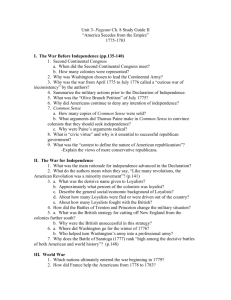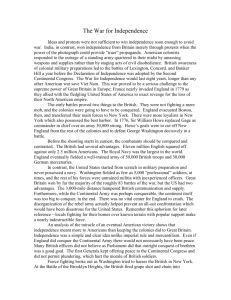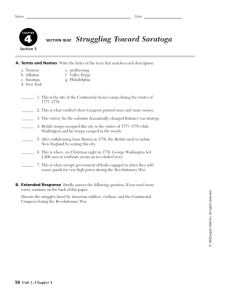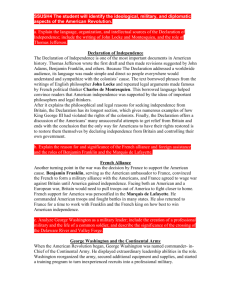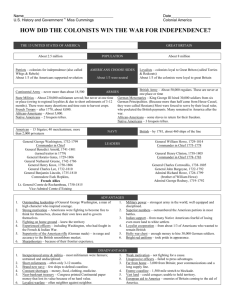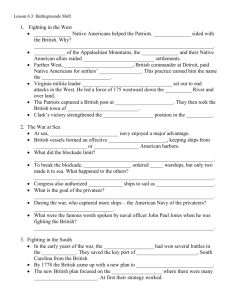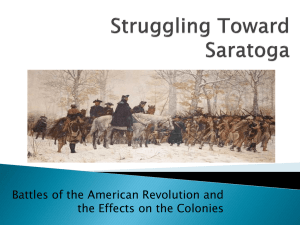Lecture Notes 2_3 - The Revolutionary War
advertisement
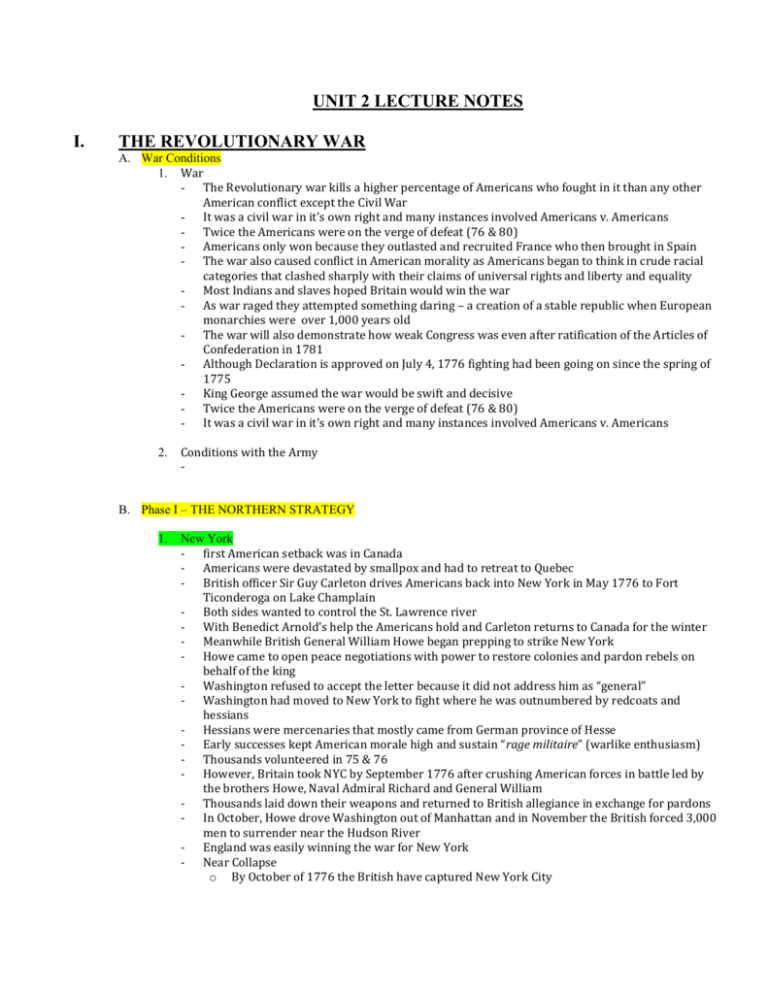
UNIT 2 LECTURE NOTES I. THE REVOLUTIONARY WAR A. War Conditions 1. War - The Revolutionary war kills a higher percentage of Americans who fought in it than any other American conflict except the Civil War - It was a civil war in it’s own right and many instances involved Americans v. Americans - Twice the Americans were on the verge of defeat (76 & 80) - Americans only won because they outlasted and recruited France who then brought in Spain - The war also caused conflict in American morality as Americans began to think in crude racial categories that clashed sharply with their claims of universal rights and liberty and equality - Most Indians and slaves hoped Britain would win the war - As war raged they attempted something daring – a creation of a stable republic when European monarchies were over 1,000 years old - The war will also demonstrate how weak Congress was even after ratification of the Articles of Confederation in 1781 - Although Declaration is approved on July 4, 1776 fighting had been going on since the spring of 1775 - King George assumed the war would be swift and decisive - Twice the Americans were on the verge of defeat (76 & 80) - It was a civil war in it’s own right and many instances involved Americans v. Americans 2. Conditions with the Army - B. Phase I – THE NORTHERN STRATEGY 1. New York - first American setback was in Canada - Americans were devastated by smallpox and had to retreat to Quebec - British officer Sir Guy Carleton drives Americans back into New York in May 1776 to Fort Ticonderoga on Lake Champlain - Both sides wanted to control the St. Lawrence river - With Benedict Arnold’s help the Americans hold and Carleton returns to Canada for the winter - Meanwhile British General William Howe began prepping to strike New York - Howe came to open peace negotiations with power to restore colonies and pardon rebels on behalf of the king - Washington refused to accept the letter because it did not address him as “general” - Washington had moved to New York to fight where he was outnumbered by redcoats and hessians - Hessians were mercenaries that mostly came from German province of Hesse - Early successes kept American morale high and sustain “rage militaire” (warlike enthusiasm) - Thousands volunteered in 75 & 76 - However, Britain took NYC by September 1776 after crushing American forces in battle led by the brothers Howe, Naval Admiral Richard and General William - Thousands laid down their weapons and returned to British allegiance in exchange for pardons - In October, Howe drove Washington out of Manhattan and in November the British forced 3,000 men to surrender near the Hudson River - England was easily winning the war for New York - Near Collapse o By October of 1776 the British have captured New York City o o o o o o o 2. By December 1776, the Howe’s has swept across New Jersey and captured key commanders of the American Army The Continental Congress soon fled Philadelphia These British victories and the volunteer system of Washington’s army were soon having a devastating effect on American forces and morale British successes seemed to prove that no American force could stand before a properly organize British army By December 1776, the Howe’s has swept across New Jersey and captured key commanders of the American Army Many residents were taking the king’s oath and many thought the war was all but over as the American forces in the northern theatre and dwindled to 6,000 with many of those ready to go home when their enlistment was up The Revolution seemed on the verge of collapse Trenton - Patriots saw the tea act as a symbol of accepting Parliamentary sovereignty so they boycotted - Washington knew he had to do something dramatic to restore morale and encourage soldier reenlistment - On the night of December 25, 1776 he crossed the icy Delaware and marched south to Trenton - There he surprised a garrison at dawn - Almost at no cost to his army, 1,000 hessian soldiers surrendered - Britain sent one of their best generals Charles Cornwallis with 8,000 redcoats to “bag the fox” - Washington - Washington defeats Cornwallis at Princeton on January 2 - These 2 victories had a tremendous impact on the war - The Howe’s are much less offensive after this point where they had been confident and in complete control - Those who had pledged allegiance to the crown were now filled with regret and they were now in American controlled territory or they fled to British lines - The Hessians were despised by Americans as they looted and raped their way through New Jersey - 1777 would be rough for the Howe’s as few would be willing to declare loyalty for the crown – the British and Hessians were losing the hearts and minds of settlers C. PHASE II – MARCH TO PENNSYLVANIA (STRUGGLES AND TURNING THE TIDE) 1. The Plan - 1777 would show none of the British precision of the previous year - Lord George Germain was the new war minister - He ordered the Howe’s to take Philadelphia - He also sent John Burgoyne (poet/playwright/general) to Canada with plans to move south and connect with other garrisons located in NYC, commanded by Sir Henry Clinton - The Howe’s had a plan to take Philly, but needed reinforcements to do it, which they did not have - They decided instead to invade by sea - This move allowed Washington to shift his men and face Burgoyne in New York 2. Loss of Philadelphia - After Trenton Washington had a new army in which he enforced more discipline and longer terms of enlistment - Congress raised the lashes a soldier could receive from 39 to 100 and increae cash bonus for 3 year enlistment - This gave army more professional training and professionalism - Imporvements did not show until 1778 in the Continental Army soldiers in continental army were often poor some were even British deserters Wary of his experience in New Yorkin beign trapped in a city, Washington wnet to nearby Brandywine Creek instead of trying to hold Philadephia On September 11, Howe outmaneuvered him and inflicted 1,000 casualties and forced Americans to retreat Ina surprise attack Washington won early at Germantown but the British rallied and he was forced to retreat again Wasington headed west to Valley forge where the continentals endured the most miserable winter of the war in 1777 It was there that Frederich Wilhelm, a Prussian, helped devise a war manual that helped make the Continentals more soldierly The French supplied the Marquis de Lafayette By the end of the war perhaps 1/5 of all continental officers were foreign 3. Trade Issues Ordinary civilians also suffered hardships British navy blockaded much of the Atlantic coast during the war – This disrupted American trade Necessities were often scarce and many colonists took advantage by profiteering – This is when goods are sold at extremely high prices 4. Battle of Saratoga - During this time British General John Burgoyne is advancing through New York to cut off New England from the rest of the colonies - As Americans retreated from Burgoyne they burned bridges to slow his advance - This caused the Brits to run low on supplies - The Fort Ticonderoga fell to Burgoyne (northern New York) on June 2 1777 - After this point little goes right for the British - As his Army marched towards Albany he distanced himself father away from his supply line in Canada - Soon Burgoyne would be defeated by Horatio Gates and Benedict Arnold and his army would surrender on October 17, 1777 in Saratoga - French enjoyed colonial resitance against their bitter rival, they wre still recovering from losses in the Seven Years War - InMay 1776, Louis XVI agreed to secret aid to American rebels - They smuggled supplies through British blo0ckade of Atlantic coast - 90% of gunpowder came from captured British supplies or from abroad - Without French aid Americans could not have continued the war - In December 1776, Ben Franklin arrived in France on behalf of Congress - Franklin takes by France by storm in popularity by dressing simple and taking the role of an innocent man of nature - After the surrender at Saratoga the French openly interevedned in the war - Burgoynes syurrender convineced Louis that the Americans could win the war - In Feb 1778, frankkloin signed 2 treaties with French Foreign minister Chalres Gravier, comte de Vergennes - The first created generous trading terms with the French and the second recognize Aemerican independence and created an alliance with France - They also disavowed all territorial ambitions in North America - Vergennes also brought spain int o the War in 1779 - This gave American the hope of a quick victory as George III declared war on France - Thi sent a panic wave through Britain as the Howe brothers were recalled and General Clinton was ordered to abandon Philly 5. Foreign Intervention - French enjoyed colonial resitance against their bitter rival, they wre still recovering from losses in the Seven Years War - InMay 1776, Louis XVI agreed to secret aid to American rebels - They smuggled supplies through British blo0ckade of Atlantic coast - 90% of gunpowder came from captured British supplies or from abroad - Without French aid Americans could not have continued the war - In December 1776, Ben Franklin arrived in France on behalf of Congress - Franklin takes by France by storm in popularity by dressing simple and taking the role of an innocent man of nature - After the surrender at Saratoga the French openly interevedned in the war - Burgoynes syurrender convineced Louis that the Americans could win the war - In Feb 1778, frankkloin signed 2 treaties with French Foreign minister Chalres Gravier, comte de Vergennes - The first created generous trading terms with the French and the second recognize Aemerican independence and created an alliance with France - They also disavowed all territorial ambitions in North America - Vergennes also brought spain int o the War in 1779 - This gave American the hope of a quick victory as George III declared war on France - Thi sent a panic wave through Britain as the Howe brothers were recalled and General Clinton was ordered to abandon Philly - Spanish Intervention - Spain was eager to avenge older defeats from Britain - Spanish king Charles III endured the loss of florida bt did gain louisiana territory from France - Spain moved into Florisa and founded San Diego in 1769 and explored the coast up through Alaska (Russia) - Spain never made a direct alliance with the U.S. but joined france in the war against Britain 6. The Homefront - After 1778, George III determination to continue the war bitterly divided his kingdom - Much of Britain doubted the war could be won - Trade was disrupted, taxes and debt soared, and military recruits became harder to find, French invasion became a serious threat - The war of attrition also deeply affected Ameruican settlers - Indian raids reduced harvests - Military service kept men away from productive farmwork - Loyalists raids destroyed property - Merchants lost most of their Euriopean markets due to British blockades - Household income plunged by 40% - Feeding French soldiers was burdensome - These demands led to the collapse of the Continetal dollar in 1779-80 - Continental soldiers – unpaid, ill-clothed, and often poorly fed grew mutinous - They often deserted or threatened to go home 7. Loyalists - Americans expected a quick victory with French alliance - Instead the war grew into further attrition, it became a struggle to see who would exhaust resources first - Loyalists become increasingly important to thje war effort, as a source for manpower and justification for continuing the war - Lord North argued that most settlers were still loyal to Britain, they could turn the war around, and to abandon them would be dishonorable - 8. The deep south became the likeliest recruiting ground for loyalists Most loyalists objected to British measures and acts but doubted that Parliament intended to undermine colonial government by consent For many, the choice of loyalty was not easy and painful Many waited until fighting came to their neighborhood as they stood to lose everything unless Britain protected their homes About 1/6 of the white population chose the British side of the war 19,000 men joined loyalist military units and mostly after 1778 when Britain was desperate for soldiers When given the choice most southern slaves sided with Britain In New England more fought with the patriots sensing they could gain their freedom In the south they realized their bbest chance for emancipation lay with Britain Most slaves who reached British lines won their freedom, and when Britian withdrew after the war, the slaves went with them to the Carribean, Canada, or London The war created a large amount of white and black refugees between former slaves and loyalists 20,000 slaves 70,000 colonists Thousands flocked to Canada and in a sense, the American Revolution laid the foundation for 2 nations – Canada and the U.S. Articles of Confederation - The prospect of independence touched off a debate on constitutionalism - Agreed every state needed a written constitution to limit powers of government - This of course was a response to Britain’s unwritten constitution - Britain had a patchwork constitution that was made of customs and statutes that only were created as problems arose – colonists wanted a documenmt that coulddefine government long term - They moved toward a detailed explanation of popular sovereignty – the theory that all power must be derived from the people - These debates sparked a learning process that by 1780, Americans knew that in their republic the people would be their own governors - Continental Congress met continuosly during the war - However, even though state constitutionas were hotly debated, until the summer of 1776 no national constitution had been discussed - The articles of Confederation would not be produced for another year and a half - Debate resumed on a national government resumed after Washington’s victories at Trenton and Princeton - Thomas Burke of North Carolina introduced a resolution that each state would retain its freedom and sovereignty which was accepted - Only after Saratoga would would Congress complete the articles - In November 1777, congress asked states to ratify the Articles by March 1778, but only Virginia met that deadlilne - Articels finally went into effect March 1 1781 D. PHASE III – THE SOUTHERN STRATEGY 1. British Strategy - Sensing an opportunity, Britain attacked the south with great success in 1780 - The Revolution entered it’s most critical phase and nearly collapsed - Britain took Savannah Georgia in December 1778 and restored royal government in Georgia between 1780-82 - By early 1780 they were ready to launch a major offensive - General Clinton was in charge of British war effort since 1778 and took command in Georgia in January 1780 - He devised a plan to invade Carolina and simultaneously attackthrough New Jersey and New York He was negotiating with Benedict Arnold for the surrender of West Point Arnold felt Congress had never appreciated or rewarded his heroism Arnold had begun trading intelligence for cash in 1779 He planned to conquer American forces within a year and use loyalists to pacify the countryside 2. Cornwallis and the Carolinas - By the end of May 1780, Clinton’s plan was working as he won several battles throughout South Carolina and approached the North Carolina border - Banastre Tarleton captured350 Continental’s at the North Carolina border on May 29 and killed them all in “Tarleton’s Quarter” - The policy was to pacify the rest of the state by using loyalist armies to terrorize civiliains into submission - General Cornwallis was left in southern command while Clinton sailed for New Jersey - The New Jersey plan failed, even with Arnold’s betrayal, as George Washington managed a stout defense of New York - Cornwallis’s conquest of the Carolinas proceeded rapidly though - In a short 4 months, Throughout the first part of 1780 the british had destroyed all of the continental army in the deep south and Cornwallis began his march through North Carolina - Through successful battle strategy, Nathanael Greene, outmaneuvered Cornwallis in North Carolina and was successive battles - This forced Cornwallis to retreat to Virginia where felt more confident - Greene stayed in the deep south where he and Francis Marion and reclaimed much of the region - By July 1, 1781, the British only held Savannah and Charleston 3. Yorktown - Both Cornwallis and Washington believed events in Virginia would decide the war - Cornwallis used a large British force to raid the state in late 1780 - Governor Thomas Jefferson ran desperately low on supplies and struggled to raise a miltia and little army was left to defend the state – the volunteer effort in Virginia had died out - Clinton sent Benedict Arnold to sail up the James and he conquered the capital of Richmond - Cornwallis took command for Arnold in april of 1781 - After successful raids throughout the summer, Cornwallis confidently took orders from Clinton to withdraw to Yorktown - In September Washington with general Lafeyett’s French army to siege Cornwallis at Yorktown - Francois, comte de Grasse naval force blocked British reinforcements heading to supply Yorktown - Washington cut off all retreat routes and on October 19, 1781 cornwallis surrendered his entire army of 8,000 men Yorktown brought down the British government in March 1782 Lord North resigned and George III even drafted an abdication message, which was never released The new ministry decided to pay the price of peace and commit to American Independecne - The Treaty of Paris ended the war in 1783 - Indians were appalled to learn that the treaty gave their ladns to the U.S., they had not been conquered – this would begin a long war for survival - Congress still had issues however In March 1783, Continental officers threated a coup d’etat unless they received generous pensions – this was later recalled after Washington spoke to them Many states had apprehensions that the states could unify and instead feared that they would tear each other apart E. Ending the War 1. Treaty of Paris - The Treaty of Paris ended the war in 1783 - Indians were appalled to learn that the treaty gave their ladns to the U.S., they had not been conquered – this would begin a long war for survival - Congress still had issues however - In March 1783, Continental officers threated a coup d’etat unless they received generous pensions – this was later recalled after Washington spoke to them - Many states had apprehensions that the states could unify and instead feared that they would tear each other apart 2. Effects on Slaves - Many slaves won their freedom, but conditions remained status quo in the south - The Revolution freed tens of thousands of slaves, but it gave further strength in the region people were beginning to call the “south” - Due to economic conditions of not depending on slave labor “northern” regions more often gave freedom as a reward for military service - Within a generation slavery would be abolished in the “north” o Pennsylvania would lead the way with legistlative action o In 1780 the state passed the modern world’s first emancipation statute o It declared all children born to Pennsylvania slaves would become free at age 28 o Other northern states fell in line with emancipation legistlation, New York (1799) and New Jersye in 1804 o George Washington became the only founding father to free his slaves when his will declared it upon his death in 1799 - They would become free but not equal - Race would soon become the defining factor in both regions - In the south blacks remained slaves o They remainedesential to the plantation economy and were their master’s most valuable asset o Emancipation in the south would have amounted to a social revolution and impoversished the planter class o Planters supported the chistianizing of slaves but not their emancipation, especially with the rise of cotton as the new cash crop after the war o Tragically slaves contributed a great deal to the acceptance of cotton as a new staple o Cut off from british suppies the slaves grew cotton as a substitute and planters soon realized the potential of the crop 3. Social Effect for Women - Nothing dramatically changed between the sexes post war - With men away fighting women were left in charge of households - This gave women new authority - All of them had to work harder to keep households functioning as the war cut them off from European goods - This gave women a sense of equal footing in the household but women did not insist on broader political rights - - 4. In 1780 esther de Berdt Reed organized the Philadelphia Ladies Association to relieve the sufferings of Continental soldiers, first women’s society in American history to take on a public role More women learned to read and write, especially in the NE First female academies were founded in the 1790s By 183 in the northeast the “republican mother” and “republican wife” took hold of educating the family Social Efect for Native Americans - Indians of the eastern woddlands played an active role in the war - The stakes were vital to their survival - An americna vicotyr would threaten their survival - They sided with Britain on the hope that it would halt or slow westward expansion - This helped them achieve an unparalleled level of unity - Indians became reluctant to kill eachothetr - White settlers hatred of Indians grew throughout the war – and this united tribes to unite to protect their lands - The Iroqois League remained intact until after the war, when defections to Canada shattered the tribe with British protection lost - Independence transformed American life o Free householders gained the greatest benefit and looked to expand west o Biggest losers were loyalists and Native Americans, who continued to resist settler expansion
